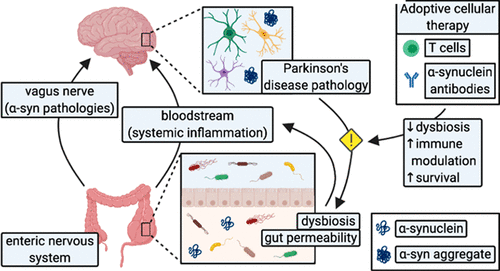当前位置:
X-MOL 学术
›
ACS Chem. Neurosci.
›
论文详情
Our official English website, www.x-mol.net, welcomes your
feedback! (Note: you will need to create a separate account there.)
Gut microbiota dynamics in Parkinsonian mice.
ACS Chemical Neuroscience ( IF 4.1 ) Pub Date : 2020-09-17 , DOI: 10.1021/acschemneuro.0c00386 Emily Klann 1, 2 , Massimiliano S Tagliamonte 2, 3 , Maria Ukhanova 2 , Volker Mai 2 , Vinata Vedam-Mai 4
ACS Chemical Neuroscience ( IF 4.1 ) Pub Date : 2020-09-17 , DOI: 10.1021/acschemneuro.0c00386 Emily Klann 1, 2 , Massimiliano S Tagliamonte 2, 3 , Maria Ukhanova 2 , Volker Mai 2 , Vinata Vedam-Mai 4
Affiliation

|
Peripheral immunity is thought to be dysregulated in Parkinson’s disease (PD) and may provide an avenue for novel immunotherapeutic interventions. Gut microbiota is a potential factor for modulating immunotherapy response. Considering the possibly complex role of the gut–brain axis in PD, we used a preclinical model to determine the effects of gut microbiota dynamics in mice receiving an immunotherapeutic intervention compared to controls. A total of 17 M83 heterozygous transgenic mice were used in this study. Mice in the treatment arm (N = 10) received adoptive cellular therapy (ACT) by injection, and control mice (N = 7) were injected with saline at 8 weeks of age. All mice received peripheral α-syn fibrils to hasten parkinsonian symptoms via an intramuscular injection 1 week later (9 weeks of age; baseline). Fecal pellets were collected from all mice at three time points postinjection (baseline, 6 weeks, and 12 weeks). DNA from each stool sample was extracted, and 16S rDNA was amplified, sequenced, and analyzed using QIIME2 and RStudio. Differences in the relative abundance of bacterial taxa were observed over time between groups. No significant differences in alpha diversity were found between groups at any time point. UniFrac measures of phylogenetic distance between samples demonstrated distinct clustering between groups postbaseline (p = 0.002). These differences suggest that the gut microbiome may be capable of influencing immunotherapy outcomes. Conclusively, we observed distinctly different microbiota dynamics in treated mice compared to those in the control group. These results suggest a correlation between the gut–brain axis, PD pathology, and immunotherapy.
中文翻译:

帕金森氏病小鼠肠道菌群动力学。
外周免疫被认为在帕金森氏病(PD)中失调,可能为新型免疫治疗干预提供途径。肠道菌群是调节免疫疗法反应的潜在因素。考虑到脑肠轴在PD中可能起的复杂作用,我们使用临床前模型来确定与对照组相比,接受免疫治疗干预的小鼠肠道菌群动力学的影响。本研究共使用17只M83杂合转基因小鼠。治疗组中的小鼠(N = 10)通过注射接受过继细胞疗法(ACT),而对照组小鼠(N= 7)在8周龄时注射了盐水。1周后(9周龄;基线),通过肌内注射,所有小鼠均接受外周α-syn原纤维以加速帕金森病症状。在注射后三个时间点(基线,6周和12周)从所有小鼠收集粪便颗粒。提取每个粪便样本中的DNA,并使用QIIME2和RStudio对16S rDNA进行扩增,测序和分析。两组之间随着时间推移观察到细菌类群相对丰度的差异。在任何时间点,各组之间的α多样性均无显着差异。样本之间的系统发育距离的UniFrac度量显示基线后各组之间存在明显的聚类(p= 0.002)。这些差异表明肠道微生物组可能会影响免疫治疗的结果。结论是,与对照组相比,我们观察到治疗小鼠的微生物群落动态明显不同。这些结果表明肠-脑轴,PD病理学和免疫疗法之间存在相关性。
更新日期:2020-10-21
中文翻译:

帕金森氏病小鼠肠道菌群动力学。
外周免疫被认为在帕金森氏病(PD)中失调,可能为新型免疫治疗干预提供途径。肠道菌群是调节免疫疗法反应的潜在因素。考虑到脑肠轴在PD中可能起的复杂作用,我们使用临床前模型来确定与对照组相比,接受免疫治疗干预的小鼠肠道菌群动力学的影响。本研究共使用17只M83杂合转基因小鼠。治疗组中的小鼠(N = 10)通过注射接受过继细胞疗法(ACT),而对照组小鼠(N= 7)在8周龄时注射了盐水。1周后(9周龄;基线),通过肌内注射,所有小鼠均接受外周α-syn原纤维以加速帕金森病症状。在注射后三个时间点(基线,6周和12周)从所有小鼠收集粪便颗粒。提取每个粪便样本中的DNA,并使用QIIME2和RStudio对16S rDNA进行扩增,测序和分析。两组之间随着时间推移观察到细菌类群相对丰度的差异。在任何时间点,各组之间的α多样性均无显着差异。样本之间的系统发育距离的UniFrac度量显示基线后各组之间存在明显的聚类(p= 0.002)。这些差异表明肠道微生物组可能会影响免疫治疗的结果。结论是,与对照组相比,我们观察到治疗小鼠的微生物群落动态明显不同。这些结果表明肠-脑轴,PD病理学和免疫疗法之间存在相关性。











































 京公网安备 11010802027423号
京公网安备 11010802027423号